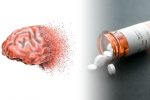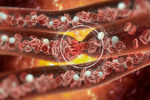
There is a lot of information around which gives people the heads up that a heart attack could be on the way, such as tightness in the chest, pain in the arm or shoulder, or shortness of breath, and that is what people immediately think of when they have any of those symptoms. Sometimes a heart attack is not the cause for any of those symptoms as it could be due to something a lot more benign than that.
However, when it comes to heart trouble, there are other signs that no one talks about very often. And once you learn about one particular organ that is tied to the heart, you will want to pay attention to it because that can also spell heart trouble.
Pay Attention To Your Stomach As That Can Indicate Heart Problems
Your stomach relates to so many aspects of anyone’s health, and it can also indicate heart problems. There are many neurons in the stomach that interact with other organs that do not have to do with the digestive tract. It all starts from when you develop from the womb as everything is connected to a long tube. And as the development happens, the tube expands into different systems that are more complex. However, the connection stays the same. It explains why the microbiome in your intestines has a link to your overall health, including immune function, heart health, cognitive health, energy, skin appearance, and more. Let’s now find out what your stomach can do that can indicate you have heart problems.
Heartburn Can Literally Be Linked To The Heart
You have been told that heartburn has nothing to do with your heart as it is the pain you encounter after eating too many spicy or fatty foods. That is the reflux you encounter when you are sleeping, especially on your right side, which can cause acid to move up to the esophagus. You can also experience heartburn if you eat late at night. However, what if you have not eaten anything fatty or spicy and you have not eaten a snack too late, and you get this sensation? Heartburn can literally be linked to the heart. Therefore, if your diet is not the reason you end up with heartburn, then you will want to get your heart checked.
If there is not enough flow to the heart, it can cause that type of indigestion-like pain. However, if the heartburn happens for a moment and does not come back, then it is only heartburn. But if it lasts for several minutes or comes back again, that can indicate heart problems. There is another issue with the stomach that can point to heart trouble.
If Your Stomach Area Is Swollen, Pay Attention
If you eat too much or drink too much, your stomach can swell, and that is normal. However, if you are not eating or drinking too much and you end up with a swollen stomach, that can point to congestive heart failure. When the blood builds up in the chest, which happens with congestive heart failure, it pours into the stomach, which is how your stomach swells from heart failure. You will also find that if you have other symptoms, such as struggling to breathe and wheezing, then you likely have congestive heart failure.
The best thing you can do is go on a heart-healthy diet and drink a lot of water which can help reduce the swelling. There is one more stomach symptom that can lead to heart problems.
Stomach Virus-Like Symptoms Can Be A Sign Of A Heart Attack
If you are experiencing nausea and vomiting out of nowhere, then you may think you have a stomach bug. However, those symptoms can also happen when you have a heart attack. The poor cardiac function, lack of blood supply, and release of metabolites can cause nausea. You may also have diarrhea and dizziness.
Therefore, if you have heart disease in your family and you are dealing with any of these issues, you may think it has to do with your stomach acting up. However, the truth is that it could point to poor cardiac function or a heart attack. Get it checked.


